- Home
- Various Authors
firstwriter.com First Short Story Anthology Page 8
firstwriter.com First Short Story Anthology Read online
Page 8
The woman pauses at the sudden memory, prompted by the photograph. Who was he, that softly-spoken old black man? Where did he come from? How did he know that Johnno had been sick again? There is no one now who can say.
The children and Minnie
This is one of those sharply-contrasted images that tell you something about the light in that part of the country. The mango trees in the background are uncompromisingly black and two of the figures in the photo have pale clothes on that come up as startlingly white. There are no shadows; it must be noon. Margie sits on the ground, her feet stuck straight out in front of her, her fair hair silvery in the glare, her eyes screwed up against the light. On either side are her dolls: one is the painted wooden doll in the earlier photo; the other, a black doll named Patsy. Next to her, Johnno, twelve now, stands up straight in his school uniform. Behind them, Minnie is standing, her hand on Johnno’s shoulder. Minnie, her black hair standing out in a halo around her head, was one of the family; she looked after them sometimes and helped her mother in the house. They shared cups of tea on the verandah and in later years wrote letters to each other at Christmas on air mail paper, crinkled at the edges.
A few hours later, when the boy returns to boarding school, he will sit grim-faced in the front seat of the car being driven to the airport by his father and Margie will cry bitterly and have to be restrained by kind hands from running down the stairs and into the car. They have all gone, now, the woman thinks. It’s as if they’d all got into the green Pontiac and she was left alone on the verandah, the mosquito gauze blurring her vision.
The Daily Advocate, September 9, 2003
This photo is grainy. There are three people in it, the local president of the professional association that is hosting a conference in this northern sugar town, and two women from the capital city. One of the women has fair wavy hair. Those who knew her as a child in this same town would recognise the likeness she bears in colouring to the tall man who was her father. Others would say that the face is more like that of her mother, who died — oh, it must be nearly thirty years ago now. This woman, whose name is Margie, is here to lay some ghosts.
In her suitcase the woman has brought with her an album of photos: the ones she has been looking at so recently. She has taken a taxi out to the place where she was born, astonished that it is so close to the town when in her memory the car trip home took an age with the red ball of the sun pulsating in her eyes all the way. The iron loco sheds are smaller and she is amazed at the idea that she was ever afraid of them. But the people she once knew have all gone and the house that she lived in as a child has been pulled down.
One by one the ropes that tied the woman to her childhood have been cut and now she feels like a boat that has been cut adrift. People are puzzled and say, "But you have your own family now," and of course that is true. But it is separate. Her children cannot remind her about being dinked on the handlebars of her brother’s bike and the shrieks that could be heard a mile off when she fell. No one else can recall the terror when Johnno split his head open diving in the river and had to be raced to hospital cradled in his mother’s arms, his head wrapped in a blue towel and his blood spreading in a dark stain above his small white face. Or the memories of cyclones which darkened the sky and shook the house and made the trees bend in the wind. Only she now remembers her father looking out at the brown flood that was the river in front of their house, saying, "It’s still rising," and the fear that curled in her mind like the black snake they found one night round the verandah post.
All gone. It seems to her that life has been measured out by the deaths of almost all who once knew her best. It is only a few months since the last of these deaths, Johnno’s, and a great dislocation has wearied her spirit. She stands under the mango tree, near the place where she and Johnno once had their photo taken with - ah, yes. With Minnie, who sent her a card, with sympathy for her loss.
A photo that was never taken
Two women stand side by side, waiting for a taxi to arrive; arms round each other’s waists. They squint into the last of the afternoon sun which is still so bright it makes their eyes water. Behind them is a neat garden with pink gerberas in it and the open door of the house that Margie is leaving now.
All afternoon, while Margie has taken secret leave of absence from her conference, these two have been sitting inside the older woman’s house. Margie has brought with her the photos from her suitcase but there has been no need of them. The old woman has those images in her head, and she brings them out and shows them to Margie, one by one.
"Your dad, now," says the old woman, "he was such a big fellow with a big laugh, always a cheerful bloke. And those gardens at the mill" — Margie thought of the mango trees and the bamboo grove, the loud crotons and acalyphas and the palms that lined the drive like soldiers — "he made those, and that place was a showpiece, in its time. Now the conglomerate’s got it, it’s not the same. Sad that they pulled your place down, though." They talk on, and the sun makes shadow lines on the old woman’s walls.
"And your mum," says the old woman, "I remember when she first came up here to the mill. She loved to wear blue … We kept in touch for a long time, you know." The breeze blows cool through the kitchen annexe and the shadows lengthen on the wall.
"The old man? Well, he was an Aboriginal fellow who lived over the way," she says, smiling at Margie’s memory of the mother who had threatened her kids. "Yeah, well, we had to put up with a lot of that ignorant talk from some people, the Aborigines and us South Sea Islanders, you know. That man used to cut cane and work at the mill. Your dad gave him a job during the war. He liked your dad; we all did; and he was fond of Johhno, too. Ah, Johnno," the old woman says, touching the fresh scar gently, "he was often that sick, but such a brave little boy. Your mum would be so pleased to think he’d grown up and had kids of his own. I remember him so well. He used to say to me, 'I’ve had a good day today, Minnie,' and I’d say, 'Course you have, you’ve been a little angel'."
Minnie pauses and looks at the younger woman. "And you!" she says, "I can’t get over how you’ve grown like your mother. A proper little Shirley Temple, you were, all that fair curly hair! Always such a little actress — I remember when you put on such a turn because you had to have a needle at the doctor’s. They had to hold you down, you know, there on that floor … you must have been four then, I suppose … You sucked your thumb a treat, in those days. …" They both laugh to think of it.
If this photo had been taken, the taxi driver would have had to take it; he was the only other person around that afternoon. He would have seen through the lens a fair-haired woman with her arm around a small, darker-skinned older one. He would have been able to see, too, that the afternoon sun made them look as if they were crying, and that the light burnished the coppery glow along the old woman’s cheekbones. He would have said that they looked as if they’d been sharing a present or as if one of them had just got back something she’d been missing for a long time.
Table of Contents

 Lady Ambleforth's Afternoon Adventure by Ann Lethbridge, Barbara Monajem, Annie Burrows, Elaine Golden, Julia Justiss and Louise Allen
Lady Ambleforth's Afternoon Adventure by Ann Lethbridge, Barbara Monajem, Annie Burrows, Elaine Golden, Julia Justiss and Louise Allen Gods & Mortals
Gods & Mortals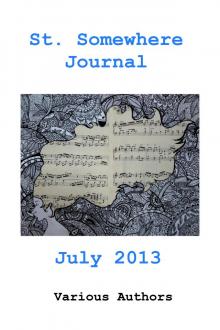 St. Somewhere Journal, July 2013
St. Somewhere Journal, July 2013 firstwriter.com First Short Story Anthology
firstwriter.com First Short Story Anthology Warcry: The Anthology
Warcry: The Anthology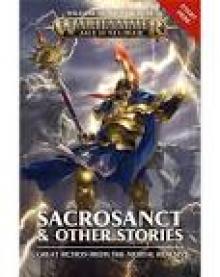 Sacrosanct & Other Stories
Sacrosanct & Other Stories Ultimate Heroes Collection
Ultimate Heroes Collection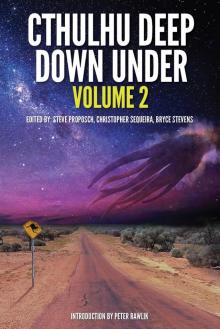 Cthulhu Deep Down Under Volume 2
Cthulhu Deep Down Under Volume 2 Erotic Classics II
Erotic Classics II Dynasties: The Elliotts, Books 1-6
Dynasties: The Elliotts, Books 1-6 Dynasties:The Elliots, Books 7-12
Dynasties:The Elliots, Books 7-12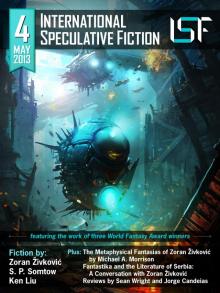 International Speculative Fiction #4
International Speculative Fiction #4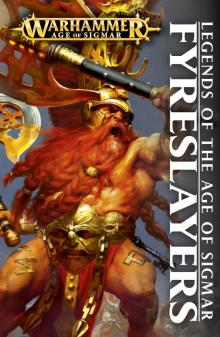 Fyreslayers
Fyreslayers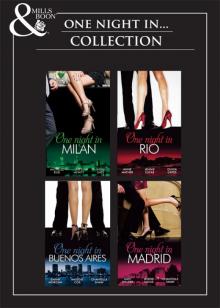 One Night In Collection
One Night In Collection Mortal Crimes 2
Mortal Crimes 2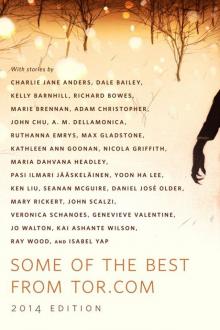 Some of the Best from Tor.com
Some of the Best from Tor.com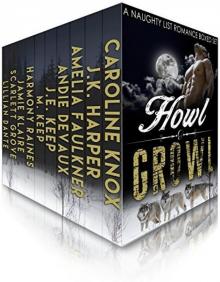 Howl & Growl: A Paranormal Romance Boxed Set
Howl & Growl: A Paranormal Romance Boxed Set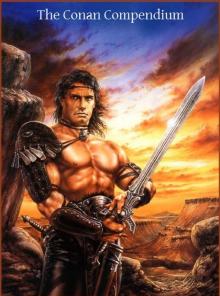 The Conan Compendium
The Conan Compendium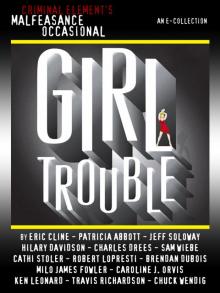 The Malfeasance Occasional
The Malfeasance Occasional Brides of Penhally Bay - Vol 4
Brides of Penhally Bay - Vol 4 Brides of Penhally Bay - Vol 2
Brides of Penhally Bay - Vol 2 Brides of Penhally Bay - Vol 1
Brides of Penhally Bay - Vol 1 School's in Session
School's in Session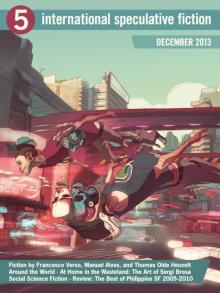 International Speculative Fiction #5
International Speculative Fiction #5 Erotic Classics I
Erotic Classics I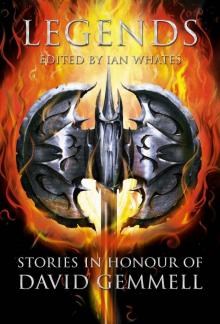 Legends: Stories in Honor of David Gemmell
Legends: Stories in Honor of David Gemmell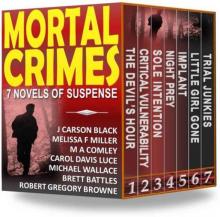 Mortal Crimes 1
Mortal Crimes 1 The Classic Children's Literature Collection: 39 Classic Novels
The Classic Children's Literature Collection: 39 Classic Novels Don't Read in the Closet volume one
Don't Read in the Closet volume one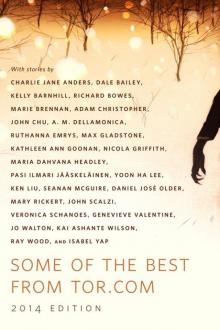 Some of the Best from Tor.com: 2014: A Tor.Com Original
Some of the Best from Tor.com: 2014: A Tor.Com Original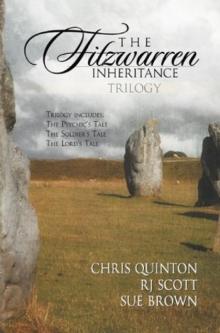 The Fitzwarren Inheritance
The Fitzwarren Inheritance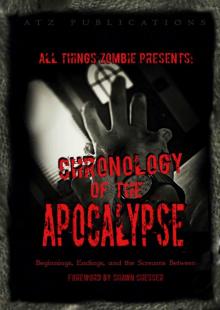 All Things Zombie: Chronology of the Apocalypse
All Things Zombie: Chronology of the Apocalypse Hammer and Bolter - Issue 12
Hammer and Bolter - Issue 12 Kiss Kiss
Kiss Kiss Dog Stories
Dog Stories Bad Blood Collection
Bad Blood Collection